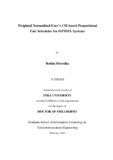Please use this identifier to cite or link to this item:
http://archive.nnl.gov.np:8080/handle/123456789/22| Title: | Weighted normalized user’s CSI based roportional fair scheduler for OFDMA Systems |
| Authors: | Shrestha, Robin |
| Keywords: | Wireless Schedulers MIMO OFDM systems CSI based scheduler Weighted PFS Bit loading |
| Issue Date: | 16-Jan-2018 |
| Abstract: | Over the past decade, radio resource allocation (RRA) has been of great importance. The problem of bit load, wireless packet/sub-carrier scheduler, and power allocation fall under the topic of resource allocation. In this research, we deal with two of the problems, namely bit loading and wireless scheduling. We design a weight factor to enhance the convergence of the bit loading algorithms and propose an adaptive grouping algorithm that groups the consecutive channel state information (CSI) to minimize the CSI requirement for bit loading as well as scheduling. Both of which are inspired by the study and comparison of various algorithms for the bit loading and wireless scheduler. The proportional fair scheduler (PFS) has been widely studied. Different algorithms for the PFS has been proposed, most of which targets to schedule equal amount of resources among the users. However, the data rate demand imposed by users is rarely considered. So, we formulate a resource allocation problem to maximize the sum rate, subject to constraints on total power, bit error rate (BER), and rate proportionality among the users for proportional resource allocation in orthogonal frequency division multiple access (OFDMA) systems. For this we propose a sub-optimal scheduler based on weighted normalized user’s CSI that merely satisfy the rate proportionality constraint determined by the demand imposed by each user. The normalization of user’s CSI can be done with either the maximum or mean of user’s CSI. The weight for each user is set iteratively to optimize the scheduling problem while satisfying the proportion among the users by adjusting the level of normalized CSI of different users. The performance metric for most of the research on scheduler depends on computer simulation. There are few researches on throughput analysis and scheduling gain for the maximum rate scheduler (MRS) and PFS typically for single path Rayleigh fading channel. However, the throughput analysis is done for opportunistic scheduler, namely for MRS and PFS, usually by assuming the Exponentially distributed power over the Rayleigh fading channels, which is not a valid assumption specifically for the multi-path Rayleigh fading channel. Furthermore, the throughput analysis weighted PFS is not done up to our best knowledge. Hence, the objective of this research is to derive analytical expressions for the average throughput achieved by the weighted PFS, particularly weighted normalized users’ CSI based scheduler that we propose in this work, and its scheduling gain when compared to the round robin scheduler (RRS) in OFDMA based single cell systems under a) single path Rayleigh fading channel environment, and b) multi-path fading channel environment. By deriving the analytical expression for the average throughput, we present a means for the performance metric of the weighted PFS, which can be further used to evaluate the scheduler in terms of throughput via numerical analysis. Through simulation we validate the accuracy of the analytical expression for the average throughput. The approximation of the long-term average throughput of weighted PFS is also derived, which is found to be equivalent to that of PFS. We evaluate the effect of various parameters on the performance of weighted PFS in OFDMA based system under both of the aforementioned channel environments. |
| Description: | A thesis submitted to the faculty of INHA University in partial fulfillment of the requirements for the degree of Doctor of Philosophy, Graduate School of Information Technology & Telecommunication Engineering, 2014. |
| URI: | http://103.69.125.248:8080/xmlui/handle/123456789/22 |
| Appears in Collections: | 000 Computer science, information & general works |
Files in This Item:
| File | Description | Size | Format | |
|---|---|---|---|---|
| 4. PhD thesids.pdf | 2.95 MB | Adobe PDF |  View/Open |
Items in DSpace are protected by copyright, with all rights reserved, unless otherwise indicated.